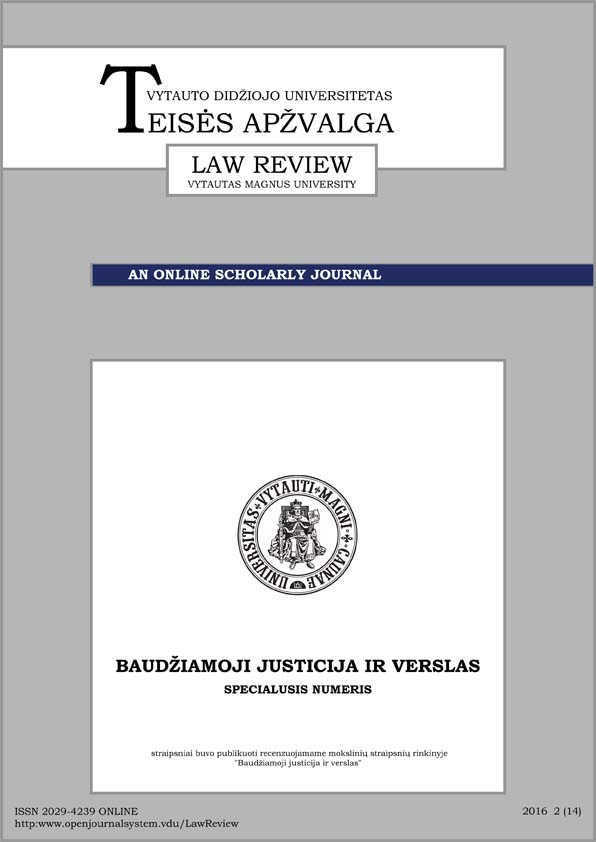Laikinojo nuosavybės teisės apribojimo problematika baudžiamajame procese: optimalaus sprendimo beieškant
Problematic Issues of the Temporary Limitation of the Property Rights in a Criminal Procedure: A Search of the Looking for the Optimal Solution
Author(s): Mindaugas Bilius, Juozas StonysSubject(s): Law, Constitution, Jurisprudence, Criminal Law
Published by: Vytauto Didžiojo Universitetas
Keywords: Criminal procedure; Temporary limitation of the property rights; Coercive measures
Summary/Abstract: Straipsnyje, įvertinus pernelyg ilgus laikinojo nuosavybės teisės apribojimo taikymo terminus, dėl kurių tam tikri nuosavybės objektai praranda vertę, atsižvelgiant į Lietuvos bei užsienio šalių teismų praktiką ir teisinę doktriną atskleidžiamos praktinės problemos, kylančios taikant laikinąjį nuosavybės teisės apribojimą, ir siūlomi jų sprendimo būdai. The question of the balance between the protection and the coercive measures of the property rights still remains relevant to the Courts or prosecutors each time dealing with the issues of applying a temporary limitation of the property rights. Lithuanian law establishes several ways of affecting property rights: it could be a coercive measure under the Criminal Procedure Code or a penal sanction under the Criminal Code. The temporary limitation of the property rights as a coercive measure is related to the human right of the inviolability of property. Therefore, any restriction of the property rights should be imposed as an ultima ratio measure, without which it would not be possible to achieve the required goals in the criminal procedure. It should be noted that even if justifying the use of the coercive measure to achieve the required goals, the right of the inviolability of property is violated if such measure is applied too long or when imposition of such measure is disproportionate. It is worth mentioning that the coercive measure - temporary limitation of the property rights could be applied even during the pre-trial investigation when there is no Court’s decision about the person’s guilt. For such reason the imposition of such coercive measure should be strictly measured. Because of fast advancement of technology and digital products in today’s world, the circle of the objects of the ownership becomes wider, broadening the meaning of the property. Accordingly, the coercive measures, directed to the restriction of the property rights, should adapt to the changing environment. According to the Lithuanian and international case law and legal doctrine, this article analyses problems when applying a temporary limitation of the property rights. Although the applicable terms of such coercive measure are set in the Criminal Procedure Code, the number of extensions in the cases involving serious or very serious crimes shall not be subject to any limits. When the case is forwarded to the Court, the Court, disposing of the case, decides concerning the imposition of the temporary limitation of the property rights or its application, and the number of extensions is also unlimited. In practice, property rights of the individuals are limited to a relatively long period of time, which results in the loss of the value of the property. Such loss, after the Court enters the decision, affects both the person whose property rights were restricted and the person, for which the benefit of the property rights was restricted. After the evaluation of the Criminal Procedure Code, which provides the possibility to impose a temporary limitation of the property rights in order to secure a civil claim, even when such civil claim is not submitted (and could not be submitted until the evaluation of the evidence in the Court proceedings) in order to avoid unnecessary use of the coercive measure, it is proposed to amend the Code, setting a term within which the victim should make a decision whether to bring civil claim or not. The term should not stop the victim to bring such civil claim later in the process.Accordingly, in order to protect the value of the property from the depreciation, when the temporary limitation of the property rights is imposed in the proceedings, it is advisable to allow to dispose such property before the Court enters final judgment. The prosecutor or the Court by the initiative of the prosecutor in regard to the circumstances of the case could enter a decision to dispose such property if there is no complaint from the owner of such property. After this, the limitations could be imposed to the funds obtained from the sale of such property.
Journal: Teisės apžvalga
- Issue Year: 2016
- Issue No: 2(14)
- Page Range: 343-359
- Page Count: 17
- Language: Lithuanian

